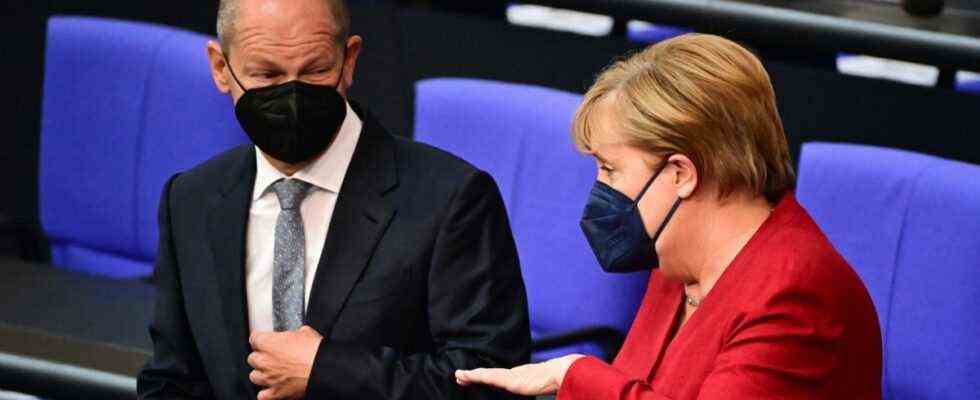“Everything has it’s time.” The Bible word is one of Angela Merkel’s favorite quotes. In a short campaign speech on August 21, she explained why she otherwise intended to largely stay out of the election campaign. “Predecessors in office who quit their political work should withdraw,” she explains. Just ten days later, Merkel abandoned this reluctance and joined the election campaign on Tuesday more clearly than she should ever have planned. There is a time for everything, but times are changing quickly – currently with almost every new survey that documents the collapse of the Union.
Merkel has criticized Olaf Scholz for his refusal to rule out a coalition with the left. The lack of clarity represents a “huge difference” between her and the SPD candidate for Chancellor, said the Chancellor. This announcement was remarkable in three ways for Merkel: On the one hand, she almost always avoided personal attacks, even when she was still running. Instead, Merkel preferred to treat her political competitors in election campaigns with the greatest possible disregard.
Second, it should not have given her any pleasure criticizing Scholz, of all people, with whom she worked properly for many years. Ten days ago, at the Union’s kick-off event for the hot election campaign phase, she hadn’t applauded when speakers buttoned the Vice Chancellor to the delight of the rest of the audience.
Thirdly, Merkel has known Scholz long enough to know that he would rather take the risk again to organize a G20 summit in Hamburg than a coalition with the left. But the plight of the CDU throws such rationalities overboard, even with Merkel.
Now, on the other hand, Scholz has recently taken it a bit far with Merkelising himself. Here a photo with the Chancellor’s diamond, there a “I can Chancellor” poster, there thieving joy over comparisons with a “successful Chancellor” (Scholz about Merkel ). Union greats from CSU boss Markus Söder to CDU vice Volker Bouffier saw it as an attempt at political “legacy sneaking”. Merkel herself would normally only have smiled mildly at Scholz’s throws. But the situation in which the Union finds itself must mean the end of fun for them too.
The years with Merkel were good, but now everything has to be different
But the Union and its candidate for chancellor have to blame themselves for the fact that it was able to get that far. Because they had only just opened the gap into which Olaf Scholz stumbled. For a long time Armin Laschet did not really know what to do with Merkel’s legacy. Accept? Knock out? In the end, he decided on both: the years with Merkel were good, but now everything has to be different. There is a saying in English for this: You can’t eat the cake and have it – you can’t eat the cake and keep it.
Olaf Scholz understood better than the CDU that this need for change is not particularly pronounced among many Merkel voters. In addition, the new thing Laschet presented often looked quite old, of which Friedrich Merz is a good example. The enthusiasm with which the official CDU took up Merkel’s intervention on Tuesday therefore also contained an embarrassing message for the Laschet Union in the 2021 election campaign: It won’t work entirely without Merkel. And when even Friedrich Merz, who just two years ago described Merkel’s government as “terribly bad” and called for the Chancellor’s early resignation, is now begging for her involvement in the election campaign, this shows impressively how great his trust in Laschet still is.

